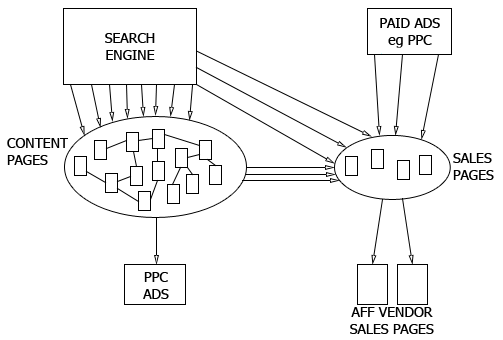 |
|||
|
|
|||
|
Background From Web Design to Internet Mastery Getting Online Making Money Online How to Build a Money Making Website Free eBooks Free Internet Marketing eBooks Books Resources Nuts and Bolts |
How to Build a Money Making WebsiteFinding a NicheThe successful money making Website must have a specific theme (niche). The general purpose space has already been cornered by the behemoths, but the Web has unlimited space for sites that serve clearly defined niches, the so-called long-tail. Choosing a niche is the most important decision in building a money making site. Your niche should be something:
Despite the claims of certain strategy marketers, the niche site operator probably won’t become a millionaire or even turn a profit without spending time and effort, but there is plenty of scope for the dedicated to make a decent living doing something they love. How Websites Make MoneyThe two main ways Websites make money are:
Affiliate marketing can be a good way to get started as:
Once you’ve some gained some experience with affiliate marketing you can continue with this strategy, focusing on proven sellers. Or you can use the market knowledge gained about what sells to develop your own product. Or maybe you already have a product, or an idea for a product you wish to develop. Defining Site GoalsA money making site operator has one or more goals he/she would like visitors to fulfill. Ideally, we’d like them to spend some money. But, failing that, other desired outcomes might be: clicking a Pay Per Click (PPC) ad, signing-up for a newsletter, subscribing to an RSS feed, “liking” the site/page on social media, bookmarking the page or simply taking the time to explore the site further. Site StructureMoney making sites generally have two specific types of page:
Every page should have target keywords, usually one primary key term with a number of secondary options. These are the phrases your ideal visitor will be typing into the search box. The primary key term should form the page title and main (h1) heading. The secondary terms should form the sub-headings (eg h2, h3). All the terms should appear (naturally) in the page text. Every page should also carry a meta description tag; this usually appears in search results and helps users determine whether to visit the site, so it’s worth taking the time to make it enticing. 
Attracting TrafficIn order to make money, in any way, you first need to attract visitors (traffic) to your site. Visitors come from a number of sources, eg:
But visitors are not all of equal value. The Web has engendered an expectation of free content. Most people, most of the time, surf the Web without wishing to spend money. A few people are looking for a solution to a specific problem, and are willing to spend money to obtain it. Obviously, the latter group should be the prime target of visitor attraction efforts, particularly of paid marketing campaigns. Among the former group only a very small number will make a spontaneous purchase, but a well-designed site offering quality content may well deliver on one of the secondary goals. The quality of traffic you are attracting can be estimated by: |